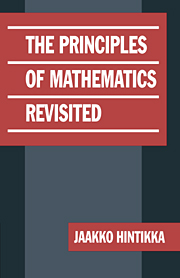Book contents
- Frontmatter
- Contents
- Introduction
- 1 The functions of logic and the problem of truth definition
- 2 The game of logic
- 3 Frege's fallacy foiled: Independence-friendly logic
- 4 The joys of independence: Some uses of IF logic
- 5 The complexities of completeness
- 6 Who's afraid of Alfred Tarski? Truth definitions for IF first-order languages
- 7 The liar belied: Negation in IF logic
- 8 Axiomatic set theory: Fraenkelstein's monster?
- 9 IF logic as a framework for mathematical theorizing
- 10 Constructivism reconstructed
- 11 The epistemology of mathematical objects
- Appendix (by Gabriel Sandu)
- References
- Index of names
- Index of subjects and titles
1 - The functions of logic and the problem of truth definition
Published online by Cambridge University Press: 15 December 2009
- Frontmatter
- Contents
- Introduction
- 1 The functions of logic and the problem of truth definition
- 2 The game of logic
- 3 Frege's fallacy foiled: Independence-friendly logic
- 4 The joys of independence: Some uses of IF logic
- 5 The complexities of completeness
- 6 Who's afraid of Alfred Tarski? Truth definitions for IF first-order languages
- 7 The liar belied: Negation in IF logic
- 8 Axiomatic set theory: Fraenkelstein's monster?
- 9 IF logic as a framework for mathematical theorizing
- 10 Constructivism reconstructed
- 11 The epistemology of mathematical objects
- Appendix (by Gabriel Sandu)
- References
- Index of names
- Index of subjects and titles
Summary
The most pervasive misconception about the role of logic in mathematical theorizing may turn out to be the most important one. Admittedly, this mistake is easily dressed up to look like a biased emphasis or an exaggerated division of labor. But it is nonetheless a serious matter. It can be exposed by asking the naive-sounding question: What can logic do for a mathematician? What is the role of logic in mathematics?
As a case study, I propose to consider one of the most influential works in the foundations of mathematics and one of the last major works that does not use the resources of modern logic. This work is Hilbert's Foundations of Geometry (1899). What Hilbert does there is to present an axiomatization (axiom system) of Euclidean geometry. Such a system is a nonlogical axiom system. It is a systematization of the truths (ordinary scientific or mathematical truths, not logical truths) of some discipline, usually some branch of mathematics or science. The systematization is obtained by, as it were, compressing all the truths about the subject matter into a finite (or recursively enumerable) set of axioms. In a certain sense, they are supposed to tell you everything there is to be told about this subject matter. Such an axiomatization, if complete, will give you an overview of the entire field in question. If you have reached in your investigation into this field a complete axiom system, then the rest of your work will consist in merely teasing out the logical consequences of the axioms.
Information
- Type
- Chapter
- Information
- The Principles of Mathematics Revisited , pp. 1 - 21Publisher: Cambridge University PressPrint publication year: 1996
